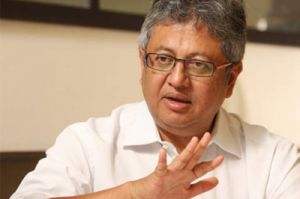Beware of militant Islam
Extremist groups are drawing support as their followers recognise that joining a democratic political process will bring them nothing.
Zaid Ibrahim, The Star
POLITICAL Islam is the term normally used to describe Islamist ideology or the manifestos of political organisations that use the Islamic agenda in their attempt to gain power in a country which practises democracy.
For many years, the Islamists believed they could gain power by participating in democratic elections. They were fascinated by Iran and the rule of the Mullah, but believed the incumbents could be changed through the ballot box.
However, following the failure of PAS and the Muslim Youth Movement of Malaysia (Abim) to secure power in Malaysia (after 50 years of trying), the poor performance of Islamist political parties in Indonesia, the fall of Mohammed Morsi and the Muslim Brotherhood in Egypt and the loss of Ennahda in Tunisia and left-leaning Islamists in Syria, it would appear that political Islam is not gaining momentum.
In fact, it is losing support in most countries, which is the reason we are seeing the rise of militant Islam today. This is where the danger lies.
The reason why the Islamic State (IS) and other militant groups such as the Taliban are beginning to attract support from Muslim extremists all over the world is the recognition by their followers that participating in a democratic political process will bring them nothing.
They, of course, will not blame their unrealistic plans for their respective countries or their extreme views and anti-democratic approach to politics as the cause of their weakness.
They have a standard response. If the people do not accept their plans, then these people are renouncing God and must be punished, including by amputation and death by stoning.
This attempt to bring God into politics and use Him to gain power is naïve. If not for their violent conduct, we all could dismiss them as dreamers misled by false thinking and poor education.
Now they believe elections and the role played by the institutions and elitist bureaucrats will prevent them from gaining power. The militants assert that Islamic power must come through the power of guns (swords) or by the sheer brutality of their actions.
By instilling fear in the population and by the violent conduct of their followers shown towards dissenters and those who oppose them, they hope to usurp power.
Ayman al-Zawahiri, the eye surgeon who founded the Islamic Jihad group and is now the leader of al-Qaeda, was spot on after all when he told the Muslim Brotherhood that participating in a democractic election in Egypt would not bring any success to the Islamic group.
That’s why we are seeing the proliferation of groups in Syria and Iraq that want to wrest power by force.
I was therefore not surprised that despite the big show by the Kelantan legislators, there was no support for hudud elsewhere from the elites and top officials from Putrajaya. I do not think the Malay Rulers are excited about hudud either.
I hope the fundamentalists in Umno are still a small group, as they were when I was in the party. Due to this lack of support for hudud, groups such as Hizbut Tahrir now believe using democratic means to introduce hudud are haram.
Islamic law, according to its spokesman Abdul Hakim Othman, must be implemented in its entirety in Malaysia and there is no need to obtain approval from the state assemblies or Parliament. In other words, political Islamisation can be achieved only by violent means.
This is where the Government, including the Inspector-General of Police, must be constantly vigilant in keeping a lookout for these Islamic groups.
Today, they have no shame and showed no respect for the democratic institutions in our country when they introduced hudud.
They knew, for instance, that a state law is void if inconsistent with or contrary to federal law, and yet they had no qualms introducing the Bill in the Kelantan state assembly, knowing that there are many Federal laws which render the state enactment void.
They also knew that the views of the Conference of Rulers must be obtained before tabling such a measure, but they did not bother to do that either.
In short, they are already showing signs of disobeying the laws of the country.
This is why the hudud subject should be put to rest as soon as possible. The extremists will be motivated to use violence if they think the people in Putrajaya will capitulate.
There must be a clear statement to the contrary and a plan of action from Putrajaya that militancy and conduct that violates peace will not be tolerated.
The extremists will put pressure to achieve their aims, and it is critical that Putrajaya show them it is resolute in opposing hudud and militant Islam.
Statements such as the one made by Tourism and Culture Minister Datuk Seri Mohamed Nazri Abdul Aziz are helpful, but there is nothing like a concrete policy statement from the Cabinet. It is long overdue.
Malaysians and the world are waiting and watching. Militancy is difficult to overcome when it ripens and floods the streets, for it can penetrate into the far corners of society unless it is nipped in the bud.
If we can do that, we can probably avoid the catastrophe of open conflict – as what is happening in Syria – which would allow us to grow, slowly but surely, as a prosperous democratic nation.
The choice is dependent entirely on Putrajaya.


